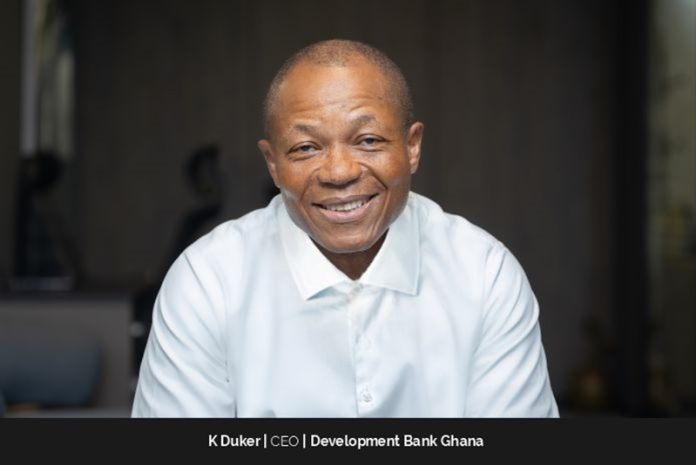The journey of Development Bank Ghana (DBG) is intricately woven into the daily experiences and aspirations of individuals and families across Ghana. From the farmer tending to fields, to the enterprising young person striving to launch a startup, and the determined market woman ambitiously growing her business, and all those forging a path towards a brighter future. While others may see these pursuits as mere jobs, DBG sees lives and legacy.
DBG has become an indispensable financial backbone in Ghana, particularly supporting key sectors such as agriculture and technology. As of May 2024, DBG had disbursed over GHS 1.3 billion in loans, providing strategic financial interventions that have helped stabilize and grow these industries, even in times of economic uncertainty. DBG has allocated substantial resources towards empowering women-led businesses. So far, 137 million Ghana Cedis has been directed towards supporting gender equality to foster economic diversity and promote mass prosperity.
To safeguard DBG’s vision of accelerating inclusive and sustainable economic transformation through a competitive private sector, the Bank, led by K Duker, is committed to ensuring its long-term financial sustainability, which typically hinges on predictable funding. This requires not only attracting investors and funding partners but also maintaining their confidence through dedicated effort, trust-building, and unwavering commitment to the Bank’s mission and objectives.
DBG truly exemplifies how vision and innovative approaches seamlessly converge to meet and surpass the rigorous demands of development finance. The Bank’s strategy to securing predictable funding is multifaceted, combining strategic leadership, innovative financial instruments, and robust risk management practices. This comprehensive approach ensures that DBG continues to be resilient and forward-thinking, because the vision to improve lives is only protected when the business is sustainable.
Community of Development Banks
Drawing parallels from the adage “It takes a village to raise a child,” DBG, while wholly owned by the Government of Ghana, is backed by a community of global development banks. Their steadfast support not only fueled the inception of Development Bank Ghana but also continues to propel our strategic initiatives forward.
The World Bank Group has been a pillar of development globally since 1944, with a steadfast commitment to reducing poverty and promoting sustainable development. In 2020, they launched the Ghana Development Finance Project with a significant investment of $250 million. This visionary project, emerging from an extensive feasibility study, aims to stimulate economic growth and job creation, focusing particularly on SMEs and vital sectors such as agribusiness and manufacturing. The Development Bank Ghana, birthed from this initiative, is designed to bridge long-standing financial gaps and enhance our nation’s economic competitiveness.
The European Investment Bank, known for bolstering economic growth and regional integration within the European Union since 1958, has extended a line of credit of €170 million to DBG. This substantial support underscores the EIB’s confidence in our potential to drive significant economic changes in Ghana.
KfW Bank, a beacon of reconstruction and sustainable development in Germany since 1948, has generously provided DBG with a loan of €46.5 million. This funding is pivotal in supporting our green and sustainable initiatives, laying down the infrastructure for a resilient Ghanaian economy.
The African Development Bank, dedicated to spurring sustainable economic development and social progress across Africa since 1964, has fortified our foundation with a grant of $38.3 million. This grant is a testament to the AfDB’s commitment to nurturing economic transformation across the continent.
These partnerships are a collective testament to the global confidence in Ghana’s potential and DBG’s role as a catalyst for change. Together with these esteemed institutions, DBG is set to transform the economic landscape of Ghana, ensuring prosperity and sustainability for future generations. We are immensely grateful for the trust and resources that these partners have invested in DBG. Their support enables us to move forward with confidence and determination, committed to achieving inclusive growth and economic resilience for Ghana.
Challenges to the Traditional Development Bank Model
Despite this great support there is a realism that that the traditional development bank business model is not sustainable without predictable and regular replenishment. This is because as a Development Bank, DBG faces three existential threats to financial sustainabiliy
- High-Risk Investments: DBG is tasked with revitalizing underserved sectors, committing to investments in areas that, while crucial for diversification, are often neglected by traditional financiers due to their volatility.
- Limited Profitability: In alignment with its developmental mandate, DBG is constrained from significantly boosting profits by transferring interest rate increases to its borrowers. This approach ensures that financial support remains accessible and affordable, especially during economic downturns.
- Role During Crises: As a designated ‘stress partner,’ DBG’s role becomes even more crucial during economic crises. It provides stability and support when other financial institutions may retreat, acting as a stabilizing force within the financial sector and ensuring continuity in funding for critical development projects.
Macro-Economic Challenges: Impact of Economic Downturns only worsen the congenital problem
The recent global and local economic downturns have accentuated the need for a change to the unsustainable traditional model:
- Inflation: Ghana experienced dramatic inflation rates, peaking at 54.1% in late 2022, which posed significant challenges in maintaining the cost of operations without compromising service delivery.
- Currency Depreciation: Alongside inflation, the Ghanaian Cedi faced significant depreciation, dropping by 46.6% in USD terms from March 2021 to March 2024. This depreciation severely impacts the value of DBG’s equity, originally valued at USD 238.2 million, but consequently decreasing to USD 127.3 million.
… And Still, We Thrive
Despite the economic turbulence, DBG has demonstrated remarkable resilience and effectiveness:
DBG as a Stress Partner: In times of economic volatility and uncertainty, DBG stands as a steadfast stress partner for businesses in Ghana. As one illustration in the hospitality industry, DBG provided funding for local hotels during the COVID-19 pandemic when their businesses were most vulnerable, and many banks could not lend to them. One hotel for instance, received a DBG loan of GHS 128 million through DBG Partner Banks to renovate and expand their facilities, consequently creating about 188 direct jobs and 750 indirect jobs. Another Hotel used a DBG loan to upgrade from a 2-star to a 3-star establishment, increasing their staff from 30 to 55. Business growth is expected to reflect in their respective fiscal and foreign income contribution to the Ghanaian economy. DBG ensures continuity and resilience by helping businesses and communities navigate challenges with confidence.
DBG as a Catalyst: DBG’s innovative approaches to development finance is strongly reflected in its role as a catalyst. In collaboration with Proxtera (Singapore) and Bank of Ghana (BOG), DBG has curated the Ghana Integrated Financial Ecosystem (GIFE) project. GIFE is a platform designed to support MSMEs through training, marketplace integration, financing, equity building, and market listing. The GIFE project, under the Bank of Ghana’s Sandbox, has successfully onboarded 5,843 SMEs and disbursed 8 million Ghana Cedis to some SMEs through Consolidated Bank Ghana (CBG) without collateral. As a catalyst, DBG also strives to position Ghana as a burgeoning hub for financial technology and innovation. A typical example is the 3i Africa Summit, organized in partnership with BOG and Elevandi (Singapore), in May 2024. The Summit fostered new partnerships and attracted international investment, highlighting DBG’s role in driving significant socio-economic impact and positioning itself as a catalyst for change even under challenging conditions.
DBG as a Collaborator: DBG continues to collaborate with relevant partners and stakeholders to drive impact. To promote agribusiness and food security for example, DBG has collaborated with the Ghana Incentive-Based Risk-Sharing System for Agricultural Lending (GIRSAL). DBG, in partnership with GIRSAL enhances agricultural financing through deal facilitation, project monitoring, partial credit guarantees, and capacity building of Participating Financial Institutions (PFIs) and SMEs. The partnership supports large-scale integrated projects in key agricultural value chains, leveraging complementary strengths to stimulate and bolster agricultural financing. Additionally, DBG’s introduction of Partial Credit Guarantees (PCGs) further mitigates risks for lenders, making it more feasible for SMEs to access the necessary funding.
Establishing a New Paradigm
The future of sustaining development banks goes beyond reliance on external funding. DBG is uniquely positioned at the intersection of financial institutions, MSMEs, and the Government, DBG is leading the wave of African development banks evolving from financiers to ecosystem builders. By standardizing underwriting terms, behavioral expectations, and policy frameworks, DBG has the potential to unleash synergy that enhances the efficiency and reach of development initiatives. The aggregation and monetization of these synergies point to a sustainable future. This integrated strategy will define the future success and sustainability of development banks. DBG leads this transformative shift, demonstrating that when these sectors align under common goals, the potential for substantial, scalable impact is unlimited.
DBG is working hard to consolidate our effort into DBG+, a complex ecosystem bringing together multiple stakeholders to deliver a holistic solution that will revolutionize SME enablement.
Conclusion
DBG sets a standard for excellence in development banking in Africa by adhering to strict governance standards and best practices, enhancing both its credibility and operational effectiveness. Ghana has seen development banks in the past that could not sustain the traditional development bank model and were compelled to transform into commercial retail banks to stay afloat.
In contrast, DBG stands as a testament to the power of resilient leadership and strategic management in development banking. By navigating the sector’s inherent challenges with a blend of innovative strategies and leadership, DBG establishes a new benchmark for how development banks can drive significant socio-economic impact, even under challenging conditions. Through its actions and achievements, DBG not only supports but inspires, proving that with determination and vision, even the steepest challenges can be surmounted.
DBG simply does it different!





